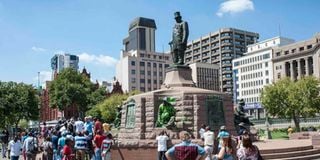The ugly face of racism lurks in South Africa

People visit the defaced statue of Paul Kruger in Church Square, Pretoria on April 6, 2015. South Africa has seen a new wave of anti-colonialist protests that started at the University of Cape Town where students demanded the statue of Cecil John Rhodes to be removed from the campus ground as it represents institutionalised racism.
The video is both banal and shocking: A White South African student casually urinates on the laptop, books and desk of a Black learner, the surprisingly calm Black student capturing the event on his phone.
The video of the incident, which occurred at the University of Stellenbosch on Sunday, immediately went viral and has reignited the vexed issue of racism in South Africa.
Under democracy, all South Africans are equal under law and discrimination is outlawed.
In reality though, a country once infamous for its overt and globally known system of White domination and oppression of Blacks, has not slipped the bonds of its dark past.
Social media, followed by more traditional media, focused on the story.
The entire underbelly of the Rainbow Nation’s unresolved residual racism crisis has been opened up for reconsideration.
At stake is whether South Africa has fully come to terms with its colonial and apartheid past beyond Archbishop Desmond Tutu’s Truth and Reconciliation Commission hearings.
Since the advent of “non-racist South Africa” under Nelson Mandela in 1994, there has been a steady drip of incidents with overt racism as a prime driver.
Cases include White farmers firing at Black workers and of White-on-Black beatings and apartheid-style abuses.
There have also been few high-profile cases of racist speech, with prosecutions and convictions. These have been counter-pointed with a growing tide of farm murders, mostly committed on Whites, plus a national reputation as one of the most dangerous places in the world when it comes to house break-ins.
In the light of serious racist incidents, the Stellenbosch University one may seem minor.
But it has touched a deep cord, with South Africans of all races demanding to know if some citizens will ever get over racist attitudes.
With a video of the event as his indisputable evidence, 20-year-old student Babalo Ndwayana – a first-year agricultural business management enrolee – laid charges of breaking and entering, malicious damage to property and racism.
Ndwayana says first-year law student Theuns du Toit is the person he videoed while conducting a “disgusting act of overt racism”.
Stellenbosch suspended Du Toit, with authorities saying they would establish a team to look racism at the university.
Calls by the victim, and those coming to his defence, for an expulsion of Du Toit seemed likely to meet success.
But under South Africa’s legal system, the university must first hold a hearing and prove the misconduct.
Du Toit has apologised and some efforts are being made to bring fathers of the students together for reconciliation.
But that line has been rejected by both Ndwayana and his father.





